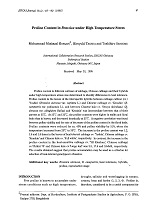Proline content in different cultivars of cabbage, Chinese cabbage and their hybrids under high temperature stress was determined to identify differences in heat tolerance. Proline content in the leaves of the interspecific hybrids between cabbage cultivar (cv.) 'Yoshin' (Brassica oleracea var. capitata L.) and Chinese cabbage cv. 'Kenshin' (B.campestris var. pekinensis L.), and between Chinese kale cv. 'Sen-yo shirobana' (B.oleracea var. alboglabra Bailey) and 'Kenshin' was intermediate between that of their parents at 35℃. At 25℃ and 35℃, the proline contents were higher in stalks and floral buds than in leaves, and decreased drastically at 35℃. A negative correlation was found between pollen viability and the rate of decrease of the proline content in the floral buds. Proline contents were reduced by ca. 40% and pollen viability by 51%, when the temperature increased from 25℃ to 35℃. The increase in the proline content was 1.2, 1.6 and 1.8 times in the leaves of heat-tolerant cabbage cv. 'Yoshin', Chinese cabbage cv. 'Kenshin' and Chinese kale cv. 'Full white', respectively. In contrast, the increase in the proline content in the heat-sensitive cabbage cv. 'YR Kinshun', Chinese cabbage cv.'Chihiri 70' and Chinese kale cv.'Large leaf’ was 3.5, 17.6 and 3.6-fold, respectively. The results obtained suggest that proline accumulation may be used as a criterion for selection of heat-tolerant genotypes in Brassica.

